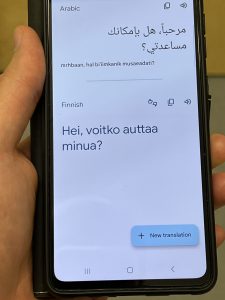Alex Berg: Access to Welfare Services for Older Immigrants with the Help of Artificial Intelligence
Immigration to Finland has increased in recent years. These immigrant populations include older people. Navigating the welfare system in a new country can be a daunting task for anyone, but especially for vulnerable groups, such as older immigrants. Access to welfare services such as social and healthcare services can be challenging, especially when the vulnerable groups are unfamiliar with the language of the host country.
Power of AI-powered translators to break barriers
Among other factors, many older immigrants can face barriers accessing the services they need due to lack of sufficient linguistic capacity. However, in an era of artificial intelligence, one can argue that AI-powered translators can be a powerful tool for helping older immigrants who face linguistic barriers. It can help them navigate the welfare system and thus enabling them to access the necessary social and healthcare services.
For example, one the features of the AI-powered translators is the automatic translation of webpages to a user-defined language. This can enable older immigrants to better recognize the available services present on the internet. The camera feature can also be helpful in real-life situations, where the user can get a real-time translation of a text in a foreign language.
Nevertheless, there are several issues at hand regarding the use of AI-powered translators by older immigrants. Firstly, AI-powered translators are not error-free. In the context of translating social and healthcare services related information, inaccuracy can lead to serious consequences both for the older immigrant and the welfare system.

Secondly, using AI-powered applications in real-time can be time consuming, and requires extra effort to utilize. This can cause frustration both for older immigrants and the social and healthcare staff, especially when there are queues and waiting times for treatments in hospitals.
Moreover, even though some AI-powered translators offer real-time voice translation, the service is mainly only useful for texts. Voice translation is only available in a few languages, and its accuracy can suffer greatly, especially in crowded places and in settings where different accents and dialects are used.
Older immigrants may also lack the necessary IT skills that would enable them to use AI-powered translators, which can exclude many of them from making use of the tool.
Despite their limitations, however, AI-powered translators are expected to improve in the future, but it can still take years for these applications to include more languages, as well as to improve the voice recognition accuracy.
Importance of providing IT skills
What can be done to increase the likelihood of using AI-powered translators by older immigrants? For a start, basic IT skills can be provided for older immigrants in their native language. This can be seen as killing two birds with one stone. In addition to being able to use AI-powered translators, older immigrants will need the IT skills due to the increasing number of digital services in the public services and more specifically in the welfare sector.
This is especially the case in Finland, as the country is renowned as being one of the most digital countries in the world. This means that even native Finns can be excluded from using some digital services if they lack the necessary IT skills or if they do not have family members that can help them navigate the system.
It is estimated that 10% of the population in Finland do not have access to digital services. Even though this percentage includes children who cannot have access to digital services, it also consists of a large portion of the older population in Finland. Not only can the inability to access
digital services reinforce the exclusion of older population in Finland from accessing healthcare and social services, but it can also increase the likelihood of facing bureaucracy in a system that is becoming more difficult to navigate with the use of conventional ways.
The provision of IT skills can thus help older immigrants use AI-powered translators as well as better navigate the digital services. This is crucial in the sense that more services are becoming exclusive to digital access, which can have negative impacts on all older populations in Finland.
Alex Berg is a doctoral researcher in the Neuro-Innovation PhD Programme. He is working at the UEF Law School and his research addresses the legal rights of older immigrants and immigrants with dementia in Finland.